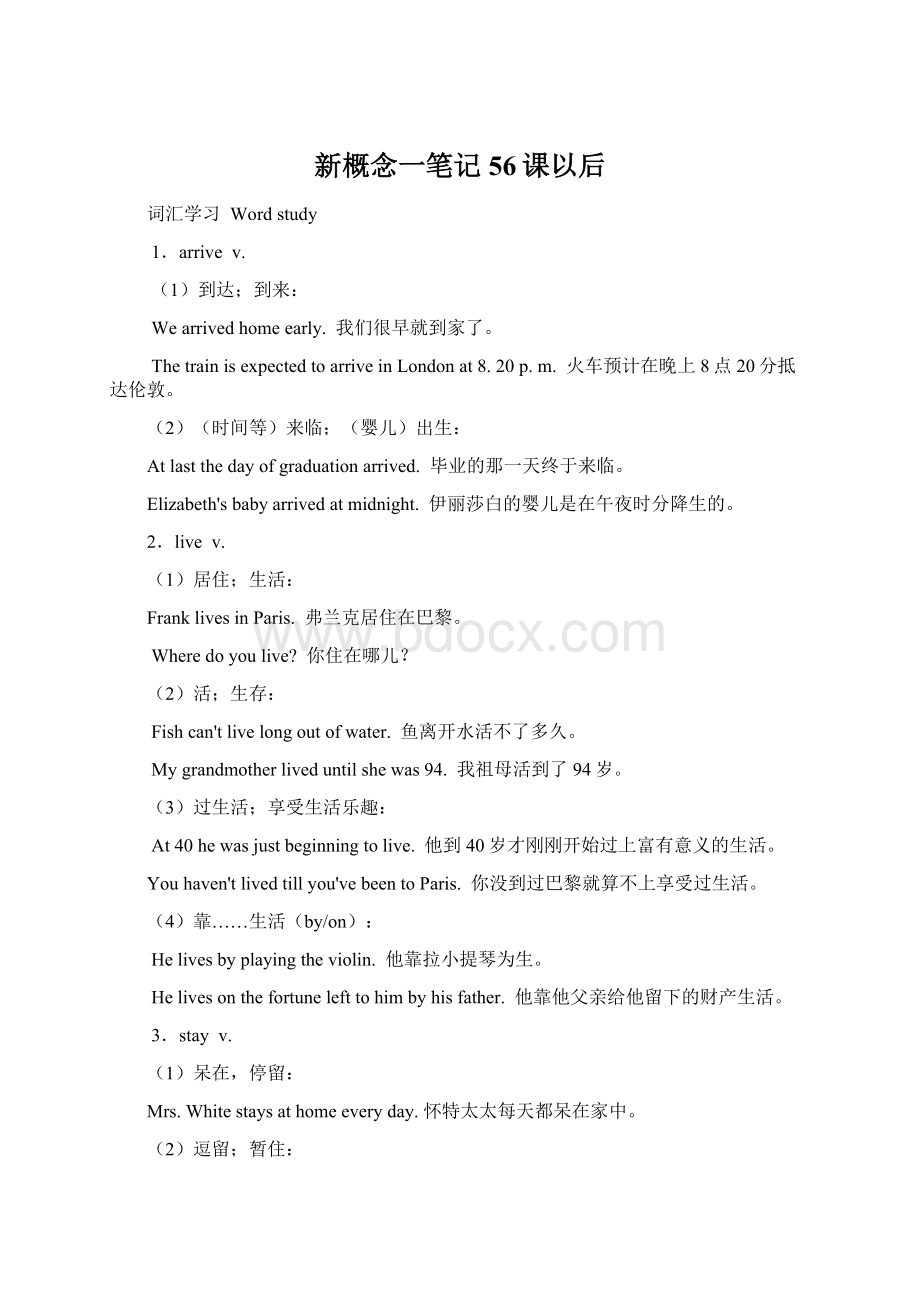新概念一笔记56课以后.docx
《新概念一笔记56课以后.docx》由会员分享,可在线阅读,更多相关《新概念一笔记56课以后.docx(122页珍藏版)》请在冰豆网上搜索。

新概念一笔记56课以后
词汇学习 Wordstudy
1.arrive v.
(1)到达;到来:
Wearrivedhomeearly. 我们很早就到家了。
ThetrainisexpectedtoarriveinLondonat8.20p.m. 火车预计在晚上8点20分抵达伦敦。
(2)(时间等)来临;(婴儿)出生:
Atlastthedayofgraduationarrived. 毕业的那一天终于来临。
Elizabeth'sbabyarrivedatmidnight. 伊丽莎白的婴儿是在午夜时分降生的。
2.live v.
(1)居住;生活:
FranklivesinParis. 弗兰克居住在巴黎。
Wheredoyoulive?
你住在哪儿?
(2)活;生存:
Fishcan'tlivelongoutofwater. 鱼离开水活不了多久。
Mygrandmotherliveduntilshewas94. 我祖母活到了94岁。
(3)过生活;享受生活乐趣:
At40hewasjustbeginningtolive. 他到40岁才刚刚开始过上富有意义的生活。
Youhaven'tlivedtillyou'vebeentoParis. 你没到过巴黎就算不上享受过生活。
(4)靠……生活(by/on):
Helivesbyplayingtheviolin. 他靠拉小提琴为生。
Helivesonthefortunelefttohimbyhisfather. 他靠他父亲给他留下的财产生活。
3.stay v.
(1)呆在,停留:
Mrs.Whitestaysathomeeveryday.怀特太太每天都呆在家中。
(2)逗留;暂住:
Wewerestayingatthesamehotel. 我们住在同一家饭店。
(3)持续;保留:
Thehousehastostayexactlyasitwas.这所房子必须完全保持原来的样子。
练习答案 Keytowrittenexercises
Lesson56
A
1 Thechildrengotoschoolinthemorning.
2 Theirfathertakesthemtoschool.
3 Mrs.Sawyerstaysathome.
4 Shedoesthehousework.
5 Shealwayseatsherlunchatnoon.
B
1 Whatdoesshedointhemorning?
Shealwaysmakesthebedinthemorning.
2 Whatdoeshedointhemorning?
Healwaysshavesinthemorning.
3 Whatdotheydointheevening?
Theysometimeslistentothestereointheevening.
4 Whatdoeshedoeveryday?
Healwayscleanstheblackboardeveryday.
5 Whatdotheydoatnight?
Theyalwaysgotobedearlyatnight.
6 Whatdoesshedoeveryday?
Sheusuallywashesthedisheseveryday.
7 Whatdotheydointheafternoon?
Theyusuallytypesomelettersintheafternoon.
8 Whatdoesitdoeveryday?
Itusuallydrinkssomemilkeveryday.
9 Whatdotheydointheevening?
Theysometimeswatchtelevisionintheevening.
10 Whatdoesshedoatnoon?
Shealwayseatsherlunchatnoon.
11 Whatdoeshedointheevening?
Heoftenreadshisnewspaperintheevening.
新概念第一册57-58课文详解及练习答案
课文详注 Furthernotesonthetext
1.bycar,乘汽车。
by(乘坐)表示“乘坐(某种交通工具)”,但它必须与动词连用。
表交通工具的名词前不加冠词:
byboat 乘船
bybus 乘公共汽车
byplane 乘飞机
bysea 乘船
2.onfoot,步行。
语法 Grammarinuse
一般现在时与现在进行时
一般现在时表示一般的动作或不断重复发生的动作;现在进行时表示说话时正在发生的动作,动作还没有完成。
一般现在时表示永久的情况;进行时表示暂时的情况。
进行时只用于表示动作或偶尔发生的事件(Weareeating,itisraining等等)。
有些动词(如like,want,know等)不是动作动词,因此不能用进行时态,如不能说Iamknowing或Weareliking,而只能说Iknow或Welike。
一般现在时表达某个习惯性动作,通常与时间频度副词连用,如usually,always,often,sometimes,never等;现在进行时表示此时此刻正在进行的动作,一般与now,atthemoment,today,thisafternoon,thisevening,tonight等连用。
Weusuallywatchtelevisionatnight.Butwearelisteningtothestereotonight.
我们通常晚上看电视。
但是今晚我们正在听立体声节目。
词汇学习 Wordstudy
1.play
(1)v.玩,做游戏:
Thechildrenareplayinginthegarden.孩子们正在花园里玩耍。
(2)v.参加(体育活动、比赛等):
Let'splaychess!
咱们来下棋吧!
Helikesplayingbasketball. 他喜欢打篮球。
(3)n.玩耍;娱乐:
AllworkandnoplaymakesJackadullboy.只工作而不娱乐会使人变呆的。
2.cook
(1)v.烹调;煮,烧:
Shecookedalovelymealforherhusband. 她为丈夫做了一顿美餐。
Thebeefisnotcookedenough.牛肉煮得不够熟。
(2)n.厨子,炊事员:
Tomworksasacookinalocalrestaurant. 汤姆在当地的一家餐馆当厨子。
Mydadisreallyagoodcook. 我爸爸烹调手艺特棒。
练习答案 Keytowrittenexercises
Lesson58
A
1 Sheusuallydrinksteainthemorning,butthismorning,sheisdrinkingcoffee.
2 Theyusuallyplayinthegardenintheafternoon,butthisafternoon,theyareplayinginthepark.
3 Heusuallywashesthedishesatnight,buttonightheiswashingclothes.
B
1 Whatdoessheusuallydointhemorning?
Sheusuallydrinksteainthemorning.
Whatisshedoingthismorning?
Sheisdrinkingcoffee.
2 Whatdotheyusuallydointheafternoon?
Theyusuallyplayinthegardenintheafternoon.
Whataretheydoingthisafternoon?
Theyareswimmingintheriver.
3 Whatdoyouusuallydointheevening?
Iusuallycookamealintheevening.
Whatareyoudoingthisevening?
Iamreadingabookthisevening.
4 Whatdoyouusuallydoatnight?
Weusuallywatchtelevisionatnight.
Whatareyoudoingtonight?
Wearelisteningtothestereotonight.
新概念第一册59-60课文详解及练习答案
课文详注 Furthernotesonthetext
1.writingpaper,信纸。
paper意为“纸”、“纸张”时是不可数名词,一张纸应是asheetofpaper或apieceofpaper。
类似的名词还有:
glue(abottleofglue一瓶胶水);chalk(abox/pieceofchalk一盒/枝粉笔);ink(abottleofink一瓶墨水)。
2.Ionlyhavesmallboxes.我只有小盒的。
boxes后省略了ofchalk。
3.Doyouwantone?
您要一盒吗?
one代替onesmallboxofchalk。
4.Whatelsedoyouwant?
您还要什么吗?
Whatelse…?
可以看成是表示疑问的一个句式,意思是“还有什么……吗?
”else常接在疑问代词、不定代词及疑问副词后面,表示“此外”、“别的”、“其他的”。
又如:
WhoelseisfromNewYork?
还有谁是从纽约来的?
Whenelseshallwemeetagain?
什么其他的时间我们再见面?
Whatelsedidhesay?
他还说了些什么?
语法 Grammarinuse
完全动词have
(1)
完全动词have的意思相当于“拥有”、“具有”,have当“拥有”讲时,可用于所有的一般时态,却不能用于进行时态(ishaving,arehaving等)。
词汇学习 Wordstudy
1.change n.
(1)找头;零钱:
Hereisyourchange.这是你的零头。
Ihavenochangeaboutme.我身边没有零钱。
(2)变化;转换:
Roastbeefisawelcomechangefromtheusualtastelessfood.烤牛肉与平素无味的饭菜比起来实在是一种让人欣喜的变化。
Let'sgotoaFrenchrestaurantforachange.咱们去家法国餐馆吧,换换口味。
2.size n.
(1)(衣服、鞋、帽等的)尺码,号:
Whatsizedoesshewant?
她想要几号的?
Thisblouseisyoursize.这件衬衣是你这号尺码的。
(2)(尺寸、体积、规模、身材等的)大小;(数量)多少:
Therearehousesofallsizesinthattown.那个镇上有着大大小小各式房子。
Wehavechosensomeboysallofthesamesize. 我们选出了一些个头一般高的男孩子。
练习答案 Keytowrittenexercises
Lesson60
A
1 Idon'thaveanygrapes,butIhavesomepeaches.
2 Idon'thaveanytomatoes,butIhavesomepotatoes.
3 Idon'thaveanymince,butIhavesomesteak.
4 Idon'thaveanyglue,butIhavesomeink.
5 Idon'thaveanyenvelopes,butIhavesomewritingpaper.
B
1 Idon'thaveanyhoney,butIhavesomejam.
2 PennyandIdon'thaveanybeans,butwehavesomepotatoes.
3 PennyandSamdon'thaveanywine,buttheyhavesomebeer.
4 SamandIdon'thaveanybread,butwehavesomebiscuits.
5 SamandPennydon'thaveanygrapes,buttheyhavesomebananas.
6 Idon'thaveanymince,butIhavesomesteak.
7 Thechildrendon'thaveanybutter,buttheyhavesomeeggs.
8 Idon'thaveanylettuces,butIhavesomecabbages.
9 PennyandIdon'thaveanybeans,butwehavesomepeas.
新概念第一册61-62课文详解及练习答案
课文详注 Furthernotesonthetext
1.fellill,感觉病了;lookill,看起来有病。
前者指自我感觉,后者指外表形象。
ill是表语,look和feel都是系动词,可像am/is/are那样,后面跟形容词。
2.…sohemuststayinbedforaweek.……因此他必须卧床休息一周。
so表示“因此”、“所以”。
for可以引出一段时间,表示某个动作持续多少时间。
又如:
fortwohourseachday每天两小时
3.That'sgoodnewsforJimmy.对吉米来说,这可是个好消息。
句中的news是不可数名词,不是复数形式。
在英语中,有些以-s结尾的名词可作单数使用,又如:
mumps(腮腺炎),measles(麻疹)。
4.Shehasaheadache.她头疼。
根据现代英语习惯,headache前常用不定冠词a。
其他ache型的复合词也多用不定冠词,如:
anearache(耳疼),atoothache(牙疼),astomachache(胃疼)。
5.take/haveanaspirin,服/吃一片阿司匹林。
6.haveatemperature,发烧。
=haveafever.
She hasahighfever. 她在发高烧。
语法 Grammarinuse
1.完全动词have
(2)
have(和havegot)常与表示疼痛和疾病的名词连用。
关于与这种名词连用的不定冠词a/an的用法可有几种情况:
(1)必须用不定冠词,如acold(感冒),aheadache(头疼),asorethroat(嗓子疼):
Ihaveaheadache/cold. 我头疼/感冒了。
(2)不定冠词可用可不用,如catch(a)cold(患感冒),have(a)backache/stomachache/toothache(患背痛/胃痛/牙疼等):
I'vehad(a)toothacheallnight. 我牙疼了一整夜。
(3)复数形式的疾病名称前面不用冠词。
如measles(麻疹),mumps(流行性腮腺炎),shingles(带状疱疹):
Mostchildrenareinbedwithmumps. 大多数孩子们都得了流行性腮腺炎,躺在床上。
(4)被认为不可数的疾病名称前面不用冠词,如flu(流行性感冒),gout(痛风),hepatitis(肝炎)等:
Iwasinbedwithflufortendays. 我因患流感,卧床10天。
the也可以与flu,measles和mumps等词连用,如:
He'sgottheflu/themeasles/themumps. 他得了流感/麻疹/腮腺炎。
2.must
(2)
must是情态助动词(如can一样),它本身没有时态、性或数的变化,也不能单独作谓语动词(简短回答除外)。
must表示“必要性”,即某人必须做某事。
(请参见Lessons29~30语法部分。
)
词汇学习 Wordstudy
1.feel v.
(1)觉得;感到;意识到:
Icouldfeelrainonmyface. 她感觉到雨点打在我的脸上。
He'sfeelingalittlebettertoday. 他今天感觉好点了。
(2)摸,触;(客体)给人某种感觉:
Hefelthispocketsandthentookoutasmallbox. 他摸摸他的口袋,然后取出一个小盒子。
Thesilkfeelsverysmooth. 丝绸摸上去很滑爽。
(3)认为;以为;相信:
Ifeelthathehasmadeamistake. 我认为他犯了一个错误。
Ifeelitunnecessarytodoso. 我认为这样做没必要。
2.remember v.
(1)记得;回忆:
CanMrs.Williamsrememberthedoctor'stelephonenumber?
威廉斯太太记得起医生的电话号码吗?
Irememberheusedtodressinabluesuit. 我记得他从前常穿一套蓝色衣服。
(2)记住;牢记;不忘记:
ItriedhardtorememberthelongpassageofShakespeare. 我努力记住莎士比亚的大段说白。
Rememberyourappointmentwiththedentist. 别忘了你和牙医的预约。
练习答案 Keytowrittenexercises
Lesson62
A
1 Hehasacold.
2 Hecan'tgotowork.
3 Heisnotwell.
4 Hefeelsill.
5 Hemustseeadoctor.
6 Hedoesnotlikedoctors.
B
1 What'sthematterwithElizabeth?
Doesshehaveanearache?
No,shedoesn'thaveanearache.
Shehasaheadache.
Soshemusttakeanaspirin.
2 What'sthematterwithGeorge?
Doeshehaveaheadache?
No,hedoesn'thaveaheadache.
Hehasanearache.
Sohemustseeadoctor.
3 What'sthematterwithJim?
Doeshehaveastomachache?
No,hedoesn'thaveastomachache.
Hehasatoothache.
Sohemustseeadentist.
4 What'sthematterwithJane?
Doesshehaveatoothache?
No,shedoesn'thaveatoothache.
Shehasastomachache.
Soshemusttakesomemedicine.
5 What'sthematterwithSam?
Doeshehaveastomachache?
No,hedoesn'thaveastomachache.
Hehasatemperature.
Sohemustgotobed.
6 What'sthematterwithDave?
Doeshehaveaheadache?
No,hedoesn'thaveaheadache.
Hehasflu.
Sohemuststayinbed.
7 What'sthematterwithJimmy?
Doeshehaveaheadache?
No,hedoesn'thaveaheadache.
Hehasmeasles.
Sowemustcallthedoctor.
8 What'sthematterwithSusan?
Doesshehaveanearache?
No,shedoesn'thaveanearache.
Shehasmumps.
Sowemustcallthedoctor.
新概念第一册63-64课文详解及练习答案
课文详注 Furthernotesonthetext
1.playwith,玩……